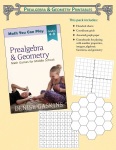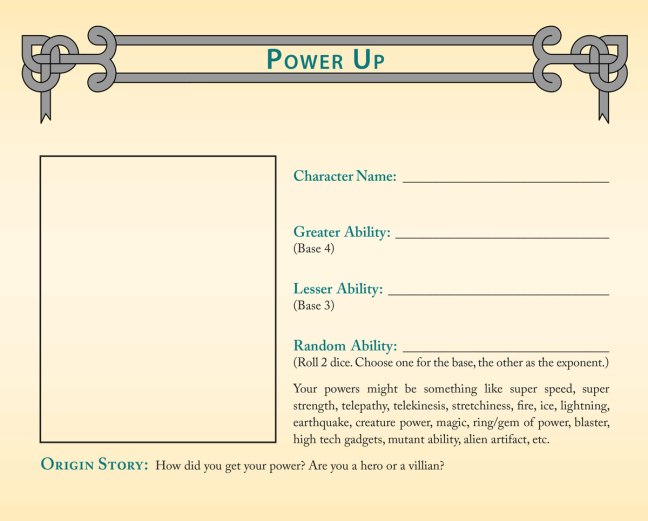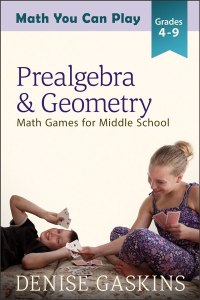This game gives students a fun reason to think about calculating with exponents.
Many parents remember struggling to learn math. We hope to provide a better experience for our children. And one of the best ways for children to enjoy learning is through hands-on play.
So what are you waiting for? Let’s play some math!
Power Up
Math Concepts: powers (exponents).
Players: only two.
Equipment: one printed character sheet for each player, two six-sided dice, pencils or markers. Calculator optional.
 The FREE 68-page printable (pdf) Prealgebra & Geometry Printables file features hundred charts, coordinate grids, assorted graph paper, and all the game boards for the Math You Can Play: Prealgebra & Geometry book.
The FREE 68-page printable (pdf) Prealgebra & Geometry Printables file features hundred charts, coordinate grids, assorted graph paper, and all the game boards for the Math You Can Play: Prealgebra & Geometry book.
Set-Up
Students create their own superheroes or supervillains using character sheets from the printables file or on regular notebook paper. Give your character a name and three superpowers, magical abilities, or technological gadgets. Describe the character’s powers:
- Greater Ability = …
- Lesser Ability = …
- Random Ability = …
Briefly explain your character’s origin story and draw a picture (optional).

How to Play
Each battle consists of three rounds, one for each of the superpowers. In the first round, players may choose which ability they want to use. For the second round, choose either unused power. Finally, the players call upon their remaining abilities.
Each player rolls one or two dice, as needed for their chosen superpower:
- Greater Ability: Roll one die. Use 4 as the base, your roll as the exponent.
- Lesser Ability: Roll one die. Use 3 as the base, your roll as the exponent.
- Random Ability: Roll two dice. Choose which is the base and which is the exponent.
Calculate how much damage your attack inflicts upon your opponent. Whoever does the most damage wins that round.
The player who wins two of the three rounds wins the battle. If there is a tie, fight one more round, with both players using their random ability.
Variations
Players get twelve base points to split between their character’s superpowers. For example, you might give one ability base 6 and both of the others base 3. A random ability (rolling two dice) costs four base points, so you could make all three superpowers random.
Power Team Assemble: Two teams of players battle each other. For each round, teammates multiply their individual scores to calculate the total damage they inflict.
History
Game creator John Golden writes:
“Note that it’s okay for heroes to fight heroes, as those kinds of misunderstandings happen all the time. Villains might fight another villain because they’re just so darn evil. (Or misunderstood.) Also, it’s okay to end in a tie: ‘We may have fought to a standstill, but I’ll get you next time, Snake Lady!’”
Read the delightful origin story for this game — including a cartoon battle between Captain Victory and the Snake Lady — at Golden’s Math Hombre blog.
* * *
 This game is an excerpt from Prealgebra & Geometry: Math Games for Middle School, available at my bookstore (Thank you for cutting out the middleman!) and through many online retailers. Read more about my playful math books at my publisher’s Tabletop Academy Press website.
This game is an excerpt from Prealgebra & Geometry: Math Games for Middle School, available at my bookstore (Thank you for cutting out the middleman!) and through many online retailers. Read more about my playful math books at my publisher’s Tabletop Academy Press website.
Special Offer: Would you like to access a growing archive of Math Monday games and other activity ideas as convenient printable pdf downloads, ready to print and play with your kids? Join me on Patreon for mathy inspiration, tips, printable activities, and more.
“Math Game Monday: Power Up” copyright © 2024 by Denise Gaskins.
